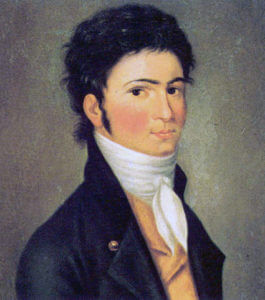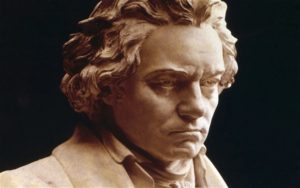Beethoven: Hardships and Brilliance
September 20, 2016

In his “SPCO Composer Guide,” former St. Paul Chamber Orchestra Senior Director of Artistic Planning Patrick Castillo describes young Beethoven as precocious pianist who idolized Mozart and inspired his father and teachers to dream that he might be as talented. As Castillo writes,
“It has become customary to divide Beethoven’s life and creativity into “three periods.”…. The early period, encompassing his work in Bonn and during his first decade in Vienna, shows Beethoven under the spell of Haydn and Mozart, creating music according to the style and taste defined by theirs. Meanwhile, he quickly established himself among Vienna’s musical elite, as Mozart had done before him, as both pianist and composer. His take-no-prisoners energy at the keyboard became the stuff of legend. Simply put, Vienna had never before heard a pianist like Beethoven. Contemporary accounts noted the “tremendous power, character, unheard-of bravura and facility” of Beethoven’s playing. Images have endured of the ferocious virtuoso requiring an assistant to pull broken strings out of the instrument as he played.”
 Hardships
Hardships
During his life, Beethoven endured many significant hardships. He lost his loving mother before age 17. From an early age, he was forced to assume increasing responsibility for the household due to his father’s heavy drinking. By his late-20s, he was already starting to lose his hearing. When his brother died almost 20 years later, a completely deaf and unmarried Ludwig tried to assume responsibility for his young nephew while fighting spiteful and prolonged legal battles with his brother’s widow. Native shyness and progressive hearing loss drove Beethoven out of society, and he never married.
 Most images of Beethoven, including the bust pictured at left, depict an intense person with deep passions and fervent beliefs. He had very strong moral convictions and worked with abandonment when inspired. In retrospect, many scholars agree that Beethoven’s best work was completed in the last decades of his life when his hearing was completely gone. Modern academics also seem to have enormous sympathy for Beethoven’s personal suffering.
Most images of Beethoven, including the bust pictured at left, depict an intense person with deep passions and fervent beliefs. He had very strong moral convictions and worked with abandonment when inspired. In retrospect, many scholars agree that Beethoven’s best work was completed in the last decades of his life when his hearing was completely gone. Modern academics also seem to have enormous sympathy for Beethoven’s personal suffering.
Contemporaries, however, assessed his character less charitably. As Castillo suggests, “Beethoven was not easy company.” Writer Johann von Goethe, who met Beethoven in 1812, wrote to his wife that the composer’s “talent amazed me; unfortunately he is an absolutely untamed personality.”
Despite, and perhaps because of his difficulties in life, there is no question that Beethoven’s impressive legacy has endured. Castillo again, “The notion of the artistic genius—preferably a tortured artistic genius—answering, not to magistrate nor even to God, but only to his muse begins with Beethoven.”
For his brilliance in the face of hardship, Beethoven is a fitting choice for the inaugural concert at the Minnesota Masonic Heritage Center. To hear the hard-wrought beauty of his genius rise and fill Ives Auditorium will be an experience to savor.




